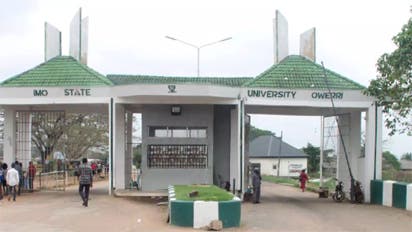
The Economic and Financial Crimes Commission (EFCC) has lost out in its bid to forfeit two Lagos property owned by a former Senate President, Dr. Bukola Saraki, to the Federal Government. This was sequel to the dismissal of a suit filed by the anti-graft agency at a Federal High Court in Lagos seeking permanent forfeiture of the two property located at 17 and 17b, Mc- Donald Road, Ikoyi, Eti-Osa Local Government Area of Lagos State to the Federal Government. Delivering judgement in the matter yesterday, presiding judge, Justice Mohamed Liman, noted that the essence of an interim order of forfeiture is to preserve the property from being dissipated by the suspect and the burden is on the applicant (EFCC) to satisfy the court that the property is a proceed of unlawful or illegal activity under the corruption laws.
The court further noted that the applicant had, in its affidavit in support of its motion for final forfeiture, stated that the property sought to be forfeited were purchased with a personal loan obtained by Saraki from Guaranty Trust Bank.
The judge, however, agreed with Saraki’s lawyer’s submission that the burden of proof for final forfeiture is on the preponderance of evidence and that the applicant had failed to show that the funds used to purchase the property were from the Kwara State government house account.
“The evidence of the transactions presented by the applicant was in respect of transactions made after he had purchased the property and the proceeds used for the purchase were legal, that is loans. “In the final analysis, the court found that the applicant failed to prove its entitlement to the relief of final forfeiture of the respondent’s property.
The application is accordingly dismissed while the interim forfeiture order made on 21st October, 2019 is hereby vacated,” the judge held. Justice Liman had, on October 21, 2019, while granting an ex-parte application brought before it by the EFCC and argued by its counsel, Nnaemeka Omewa, ordered the interim forfeiture of the two property. The EFCC alleged that the two property were acquired with proceeds of unlawful activity while Saraki was Kwara State governor.
However, upon being served with the interim forfeiture order, the former Senate President, through his lawyer, Kehinde Ogunwunmiju (SAN), approached the court to discharge the order. However, rather than vacating the order, Justice Liman ordered parties to show cause why the two property should not be permanently forfeited to the Federal government. Hearing on EFCC’s motion for final forfeiture of the property began on February 6, 2020, with the antigraft agency calling three witnesses and tendering several documentary evidences, which were admitted by the court. The EFCC had, through its lawyer, applied to court to forfeit the property to government on the grounds that the buildings were obtained with loans from a bank and repaid back with Kwara State funds.
Consequently, he applied to court to finally forfeit the property to government. But Saraki’s lawyer told the court that his client was already a successful businessman with property worldwide before he came into politics. He told the court that EFCC must prove to the court that such property was proceed of unlawful act.
The EFCC, in an affidavit attached with the motion for final forfeiture of the said properties deposed to by one of its investigators, Olamide Sadiq, alleged that the former Senate President acquired the two property with proceeds of unlawful activity Part of the affidavit reads, “Trend of cash lodgements into Saraki’s account became suspicious and in order to further disguise the source and origin of this money, the respondent changed the pattern of payment and started making payments into accounts (exhibit EFCC 3) using fictitious names.” The EFCC further alleged that Saraki, while serving as the Governor of Kwara State, withdrew over N12 billion cash from the account of the Kwara State Government and paid directly into his account domiciled in another bank and others through one of his Personal Assistant, Abdul Adama, at different intervals.


